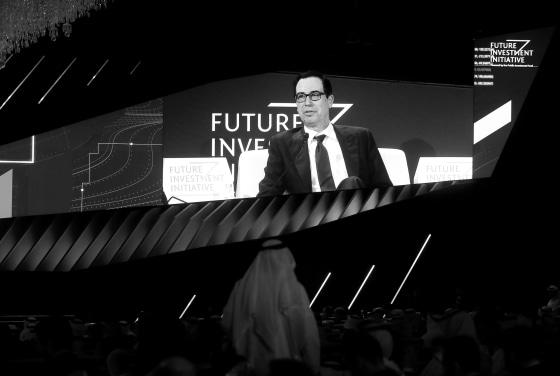Once again, Saudi Arabia seems to have bought itself a world of friendships, starting with Donald Trump and any number of those close to him.
It’s suddenly “Davos in the Desert” time again at the Future Investment Initiative (FII). And the hosting Saudis, who’ve let nothing deter their ambitions, not even the murder last year of Washington Post columnist Jamal Khashoggi, are determined to once again woo the world’s wealthy and powerful.
The hosting Saudis, who’ve let nothing deter their ambitions, not even the murder of Jamal Khashoggi, are determined to once again woo the world’s wealthy and powerful.
Started in 2017 and designed to emulate the annual Swiss gathering in Davos, the Saudis have routinely used their 3,000 guests and the $22 trillion or more in assets to rehabilitate the kingdom’s persistent image of brutality and disregard for basic human rights.
The first year of the conference in 2017 convened in Riyadh’s opulent Ritz Carlton Hotel, just two weeks before Crown Prince Mohammed bin Salman ordered dozens of the kingdom’s top former government officials, leading businessmen and investors and even 11 princes of the royal family to be detained. All were imprisoned in that same hotel, coerced and even tortured until they signed over up to $800 billion in assets.
A year later, the 2018 get-together was eclipsed by the brutal execution and dismemberment of Khashoggi in the Saudi Embassy in Ankara 10 days before the conference convened. A handful of individuals and organizations, ranging from Uber CEO Dara Khosrowshahi to the Harbour Group lobbying firm and the Brookings Institution canceled their appearance, but thousands arrived anyway.
Since then, the crown prince has sat for innumerable interviews with western journalists, expressing his deep regret over the brutal slaying of Khashoggi and “accepting responsibility” while repeatedly denying he’d ordered the killing. He’s also denied that any torture goes on in Saudi prisons, calling such a practice “heinous.” (Evidence suggests that, in fact, political activists have been severely abused, even tortured.)
The Saudis have also made every effort to use their vast oil wealth to buy themselves good will. And to a degree, it seems to be working. Saudi Arabia has agreed to purchase as much as $350 billion in arms from the United States over 10 years, ranging from main battle tanks to jet fighters. In return — call it a quid pro quo or simply business as usual — at least 2,000 American troops are being deployed to the kingdom.
Why abandon America’s staunch allies, the Kurds, who have given thousands of lives to partner with the United States in the fight against the Islamic State militant group, only to deploy such forces to Saudi Arabia? Trump has all but admitted that it’s about money. After a rocket attack, probably by Iranian-backed forces, on Saudi oil production facilities in September, Trump suggested that if the United States was to launch a retaliatory strike, the Saudis would be the ones paying for it.
Treasury Secretary Steven Mnuchin and presidential counselor and son-in-law Jared Kushner will be heading the American delegation.
This week, the world will be once again beating a path to the Saudis’ door, including many of the same figures as in the past. Treasury Secretary Steven Mnuchin and presidential counselor and son-in-law Jared Kushner will be heading the American delegation. Softbank’s beleaguered CEO Masayoshi Son is coming. The Saudi crown prince is collaborating with him on a $500 billion city in the desert, though Son has been fighting off his own scandal related to Softbank’s investment in WeWork.
A host of top financiers, bankers and investors will also be on hand, many hoping for some lucrative droppings from a still-on-the-horizon public offering of Aramco shares. This could be the world’s largest-ever IPO. The crown prince is seeking a valuation of $2 trillion for the company, though most bankers are putting the number closer to a still-staggering $1.5 trillion.
With these kinds of numbers hanging in the air, no one seems particularly anxious to raise some of the lingering questions about the conduct — past or present — of the crown prince or any of the Saudi leadership.
But if not now, when? When would be a more opportune moment for the world to hold the Saudis to task? the kingdom still needs Western investors’ deep pockets to fund Aramco’s future. It needs American troops and weapons to hold off attacks from an ever more-empowered Iran, especially since the U.S. pulled out of northeastern Syria. It is time for Saudi Arabia to become more an appropriate partner for Western democracies rather than simply a piggybank for its excesses. But that’s unlikely to happen if investors and friends keep looking the other way.

